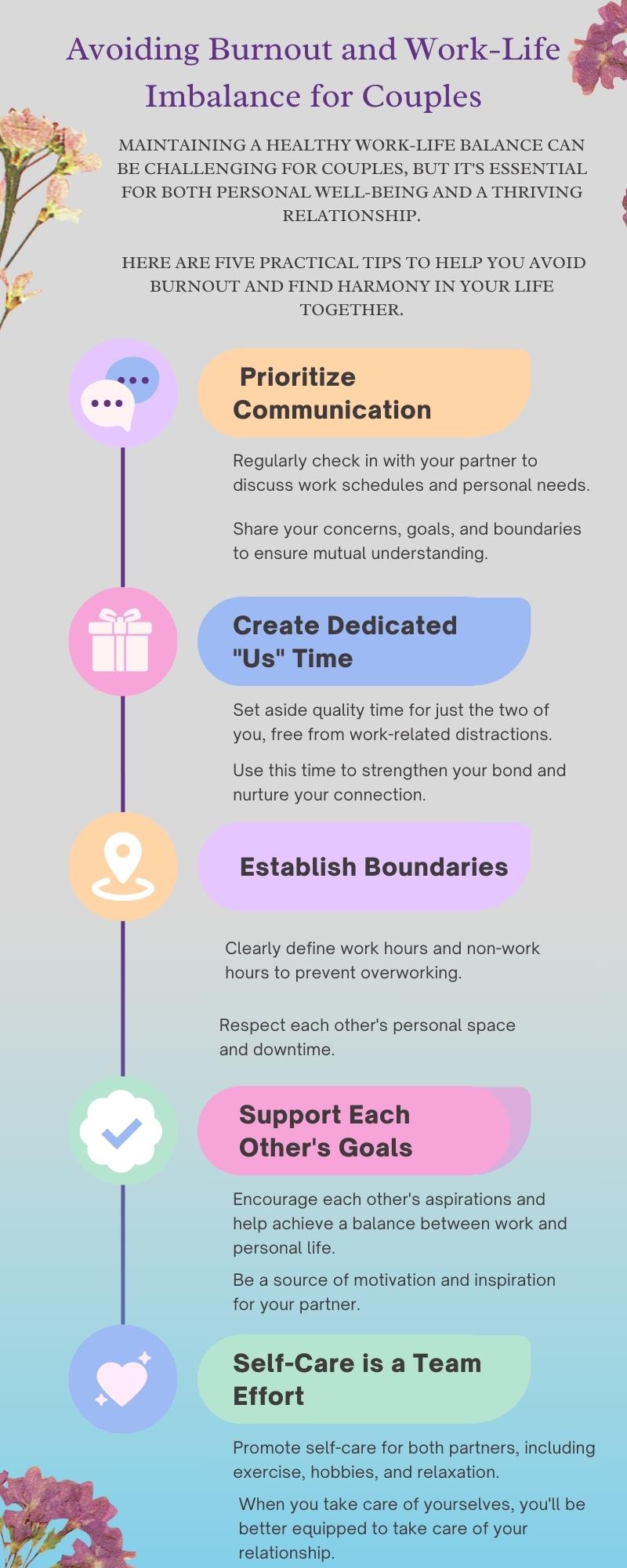Avoiding Burnout and Work-Life Imbalance
Balancing work demands and personal life can be challenging, especially for couples. With busy schedules, long work hours, and relationship needs, burnout and work-life imbalance are common issues many couples face today.
However, there are effective strategies and habits couples can cultivate to prevent burnout and maintain a healthy work-life balance together.
In this blog article, we will discuss burnout and work-life imbalance and tips to avoid work-life imbalance as a happy couple.
What is burnout and work-life imbalance?
Burnout is a state of chronic stress, exhaustion, and reduced productivity caused by prolonged exposure to excessive work demands and other stressors. It diminishes engagement, motivation, and performance.
Work-life imbalance refers to the condition where responsibilities from one domain, usually work, impinge too heavily on time, energy, and focus needed in another domain, typically personal life.
For couples, burnout and work-life conflict often emerge when partners struggle to reconcile intense job demands with needs in their relationship and home life. Fatigue and preoccupation with work make it hard to be fully present with each other, straining the partnership.
Why is it important for couples to avoid burnout and work-life imbalance?
Preventing burnout and imbalance is critical for couples for several reasons:
- Protects relationship quality – Lack of presence, intimacy, and quality time erode partnership satisfaction over time.
- Supports individual well-being – Burnout harms both the physical and mental health of each partner.
- Enables sustainable performance – Imbalance leads to poor work quality due to exhaustion and distraction.
- Strengthens coping skills – Shared stress management prevents problems from seeming overwhelming.
- Provides a model for children – Demonstrates the importance of self-care and family time to kids.
Making your partnership a priority alongside work obligations fosters a stable, supportive environment for the couple and family to thrive in.
Signs of Work-Life Imbalance and Burnout
Before exploring solutions, it’s important to recognize some signs that you or your partner may be struggling to manage competing priorities:
- Chronic exhaustion, lack of energy
- Increased irritability, mood swings, anxiety
- Lack of motivation and productivity
- Feeling overwhelmed, unable to relax
- Strained relationships, lack of intimacy
- Physical symptoms like headaches, stomach issues
If one or both partners are exhibiting these symptoms frequently, it likely indicates an unhealthy work-life imbalance that needs to be addressed.
Unmanaged, it can have serious consequences for the sustainability of a couple’s relationship and well-being. Being alert to the signs and proactively making adjustments is vital.

How to avoid burnout and work-life imbalance as a couple
1. Have Open Communication
The first step is to communicate openly with your partner about any work-related stress or burnout you may be experiencing. Sharing your struggles and listening to your partner’s concerns creates understanding and enables you to find solutions together.
- Schedule regular check-ins to discuss how you both are coping.
- Be vulnerable and honest about your challenges and limitations.
- Avoid accusations; use “I” statements to take ownership of your feelings.
- Show empathy, understanding, and active listening when your partner shares.
Approaching burnout as a team will strengthen your bond and alignment around priorities.
2. Set Boundaries
A major contributor to burnout is inadequate boundaries, which lead to work encroaching on personal life. Couples need to establish boundaries to protect their relationship and well-being collaboratively.
- Limit work talk during quality time together.
- Avoid doing work tasks during evenings, weekends, and vacations.
- Turn off notifications outside working hours.
- Set a cut-off time in the evenings to stop work and be fully present with each other.
- Take regular breaks throughout the workday to detach from work stress.
- Use vacation days as intended for real rest, relaxation, and rejuvenation.
Respecting boundaries demonstrates that you value your relationship as much as work obligations.

3. Reevaluate Priorities
When imbalance sets in, revisiting priorities as a couple can help ensure you are allocating time and energy across different life domains appropriately.
- Make a list of your individual and shared priorities across career, relationship, family, health, hobbies.
- Discuss if adjustments are needed to priorities based on circumstances and season of life.
- Plan weekly date nights and quality time to nurture your relationship.
- Schedule activities unrelated to work that bring joy and renewal.
- If needed, discuss delegating some household responsibilities to create margin.
Getting back in sync on top priorities will help guide daily decisions and prevent resentment around time use.
4. Support Each Other’s Well-Being
Partners need to actively promote each other’s health and wellness to prevent burnout contagion within the relationship.
- Encourage each other to take breaks, detach from work, and practice self-care.
- Avoid excessive venting about work to limit spillover stress.
- Help minimize each other’s workload by sharing responsibilities at home.
- Plan activities together that provide stress relief and enjoyment.
- Show appreciation for each other’s efforts and contributions, both at work and home.
Cultivating individual wellness strengthens the foundation of your relationship and guards against depletion.
5. Recharge Together
The couple that relaxes together, stays together. Jointly focusing on rest and renewal will enhance your relationship quality while also buffering against burnout.
- Take mini-breaks during the workweek to go for a walk, grab coffee, or run an errand together.
- Plan weekends getaways to decompress without work interruptions.
- Practice couple-friendly stress reduction techniques like massage, meditation, yoga.
- Disconnect from technology together to be fully present with each other.
- Cook healthy meals together and encourage good sleep habits in each other.
Making recharging a shared activity will help strengthen your bond and your ability to handle stress.
6. Prioritize self-care
Make self-care a non-negotiable part of your daily routine. This includes getting enough sleep, eating healthy foods, exercising regularly, and spending time doing things you enjoy. It is also important to schedule time for each other as a couple, such as going on dates or taking walks together.
By being intentional about boundaries, alignment on priorities, mutual support, and joint rejuvenation, couples can protect their relationship despite hectic work demands.
Your partnership should energize you, not drain you. Maintaining a healthy work-life balance together combats burnout and enables sustainable high performance. Learn here more about work-life balance for couple tips and guides.


